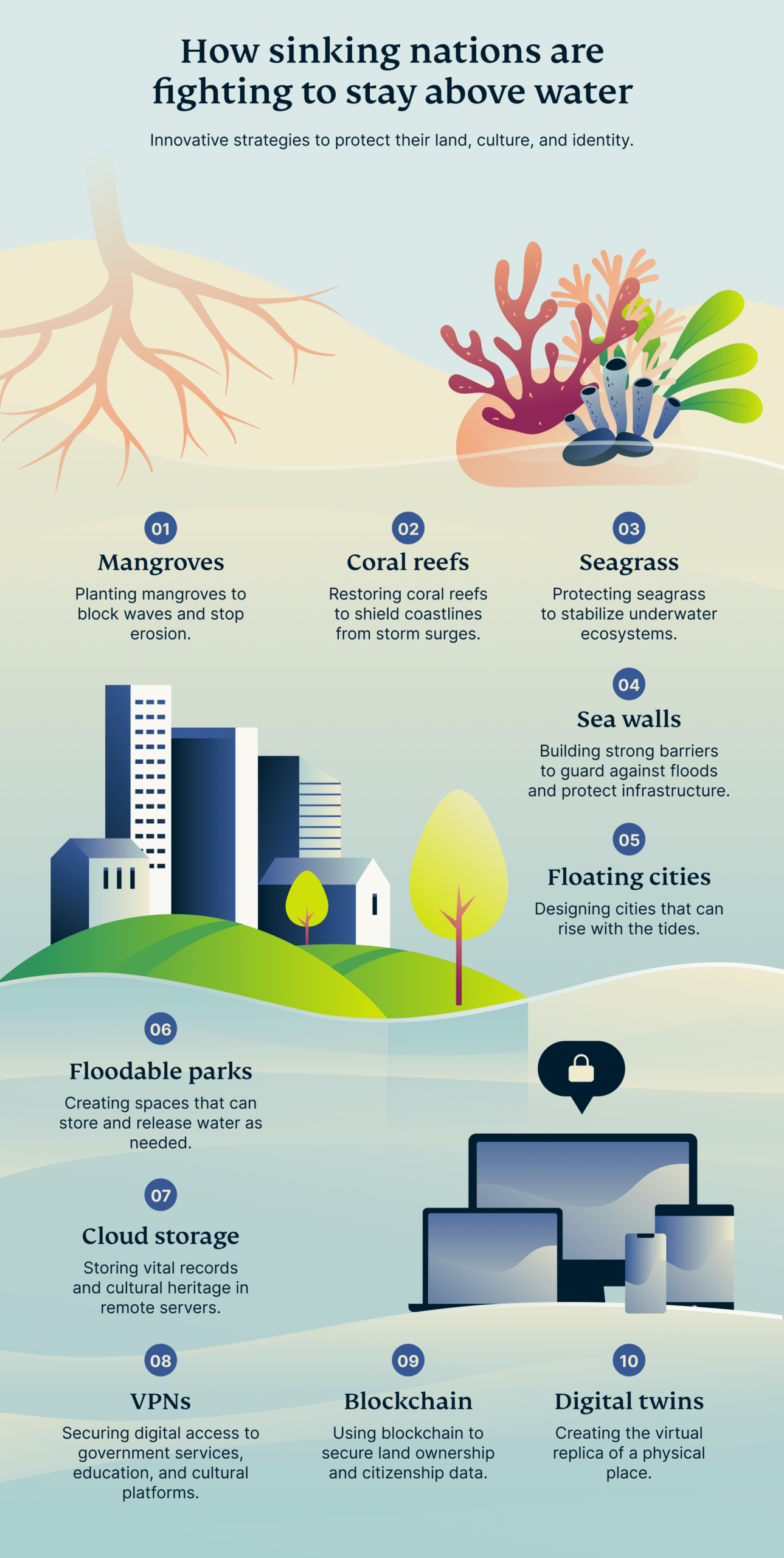As seas rise, at-risk countries lean on digital identities



Imagine a nation vanishing—not through war or politics, but as its land sinks beneath rising seas. For many island nations, this is a reality they are already preparing for. However, while a country’s physical borders might be erased, its identity can live on. The challenge is figuring out how to protect that identity when the land itself is lost.
From government archives and cultural records to access to vital services, a country’s digital presence goes beyond data. It’s a bridge to the future for displaced citizens and a way to preserve a nation’s legacy. How can vulnerable nations protect what matters most when their geography fails them? And how can technology like a VPN help them? Let’s explore the tools and strategies that are helping them endure.
The threat to low-lying nations
For many coastal and island regions, the ocean has always been a source of life—fueling economies, shaping cultures, and connecting communities. But now, it threatens to take it all away. Countries like Tuvalu, the Maldives, and Kiribati are among the most vulnerable. But they’re not alone. Across the globe, low-lying areas—from atolls in the Pacific and Indian Oceans to parts of Bangladesh and Louisiana—are facing the risk of disappearing beneath the waves.
The loss of land is just the beginning. Rising sea levels disrupt daily life, destroy crops, and force entire communities to uproot their lives. Homes, schools, and businesses are being abandoned as coastlines erode and freshwater sources turn salty. For many, the question is no longer whether they can stop the water. It’s how they can preserve their cultures, identities, and histories as their physical lands vanish.
Rising waters, shrinking worlds
The numbers are staggering. Global sea levels have risen over 20 centimeters since 1880, and the rate is accelerating. By the end of this century, projections suggest an increase of up to one meter, even with aggressive climate action. For low-lying nations, this is already happening.
In the Pacific, Tuvalu and the Marshall Islands experience frequent flooding that contaminates crops and drinking water, making life increasingly unsustainable. The Maldives, with its 1,192 islands averaging just 1.5 meters above sea level, faces erosion so severe that entire communities are relocating. Kiribati struggles with dwindling resources as saltwater intrudes into freshwater supplies, forcing some villages to abandon their homes.
And it’s not just these island nations. Across the globe, others face similar crises:

Pacific Ocean Region
The Pacific is home to some of the most vulnerable nations in the world. The Solomon Islands have already lost entire islands to rising seas, forcing communities to relocate and abandon ancestral lands. Vanuatu faces constant threats from cyclones, which erode coastlines and damage infrastructure, leaving residents with fewer safe places to rebuild.
Indian Ocean Region
In the Indian Ocean, Seychelles is losing its protective coral reefs to bleaching caused by warming waters. Coastal erosion is damaging homes and roads, while rising seas threaten freshwater supplies, making survival harder for residents who depend on fishing and tourism.
South Asia
Bangladesh’s low-lying deltas are under increasing pressure from rising seas and flooding. Saltwater is seeping into farmland, damaging crops, and displacing communities. The Sundarbans, one of the largest mangrove forests in the world, is shrinking as tides push further inland, affecting wildlife and livelihoods.
Caribbean Region
Caribbean nations face rising seas and stronger hurricanes that batter coastlines and devastate economies built around tourism. In the Bahamas, rising tides are eroding beaches and flooding infrastructure, while Barbados struggles with saltwater intrusion and storm damage that threaten homes and agriculture.
Africa
Coastal areas in Africa, including Gambia and Senegal, are losing farmland and fisheries to erosion and saltwater intrusion. Many communities rely on fishing for survival, but rising seas are reshaping coastlines and damaging ecosystems, pushing people further inland where resources are already scarce.
North America
Louisiana in the U.S. is losing land at one of the fastest rates globally. A combination of rising seas, sinking land, and hurricanes has wiped out wetlands that once acted as natural flood barriers. Communities are being forced to relocate as entire towns sink beneath the water.
South America
In South America, Suriname and Guyana face mounting threats from flooding and saltwater intrusion. Both countries have much of their infrastructure and agriculture concentrated along low-lying coasts, leaving them exposed to rising tides and storms that overwhelm existing flood defenses.
The digital crisis for sinking nations
While rising seas threaten to wipe out the physical existence of nations, the ripple effects extend far beyond what’s visible. Beneath the surface lies a growing crisis: the survival of digital infrastructure and identities. For countries already grappling with disappearing land, losing access to vital digital resources could mean a second erasure—one that severs their connection to the modern world and their cultural past.
The fragility of data infrastructure
As the physical foundations of nations erode, their digital infrastructure faces threats just as significant. Internet servers, government archives, and cultural records are at risk of being lost forever if not properly preserved. For low-lying countries, maintaining access to these resources is essential—not just for governance but for the survival of their identity.
Internet servers in jeopardy
Much of the physical hardware that powers the internet—data centers, servers, and undersea cables—is located along coastlines. Rising seas and extreme weather threaten to flood these critical systems, causing outages and the permanent loss of data. For island nations, where resources to maintain redundant infrastructure are limited, this creates a precarious situation. Without proactive measures, entire networks could disappear under water.
Government archives on the line
Governments rely on digital archives to store vital records, from land deeds and citizenship data to healthcare and education systems. When servers fail or become inaccessible, the ripple effects are enormous. Citizens may lose access to essential services, and nations may struggle to govern effectively. For displaced populations, these records are often the only ties they have left to their homeland.
Cultural records at risk
Preserving cultural heritage requires more than scanning documents or uploading videos. Nations need secure, accessible, and redundant systems to ensure that their histories, traditions, and languages aren’t erased. For many island nations, their digital archives are the only way to share their culture with future generations—particularly if they become climate refugees.
When digital identities are at risk
The erosion of a country’s physical infrastructure impacts its citizens in deeply personal ways. For many, their digital identity is an extension of who they are—used to access everything from social services to financial systems. As the land vanishes, so too can access to these important digital lifelines.
Disruption of online identities
From passports to tax records, much of modern life depends on digital accounts and identities. Rising seas can cut off access to these systems, particularly when data centers or government networks fail. Citizens risk being locked out of their own identities, unable to prove their residency, claim citizenship, or even access bank accounts.
Barriers to essential services
When healthcare records, education systems, or pension plans become inaccessible, the impact on displaced citizens is profound. Flooding and relocation often sever ties to these critical digital services, leaving people unable to access essential resources. Without proactive planning, displaced citizens may find themselves unable to access basic necessities, compounding the trauma of losing their homes.
Digital exclusion
When a nation loses access to its digital systems, the ripple effects extend globally. International aid, citizenship recognition, and financial systems often rely on digital infrastructure. A failure in these systems can prevent displaced citizens from receiving aid, asserting their nationality, or maintaining access to their funds, leaving them without a safety net during an already vulnerable time.
Fighting to stay above water
But even as their land erodes and their digital infrastructure falters, these nations are not passively watching their stories slip away. Instead, they are fighting back with extraordinary resilience—through physical defenses to protect what remains and digital strategies to ensure their identities endure, no matter what the future holds.
Turning to nature for protection
Nature has long been a powerful ally in safeguarding coasts, and many nations are working to strengthen this natural defense. For example, Bangladesh, home to the world’s largest mangrove forest, is investing heavily in restoring these vital ecosystems. Mangroves provide an important buffer, absorbing wave energy and reducing the impact of storm surges. They also stabilize the soil, preventing erosion that could otherwise accelerate the loss of land.
Similarly, the Seychelles is rebuilding its coral reefs, which serve as natural underwater barriers. Healthy coral reefs can reduce wave energy by up to 97%, protecting coastlines from erosion and storm damage. These restoration efforts are labor-intensive and require careful coordination, but they are essential to ensuring that coastal communities can withstand the forces of a changing climate.
Engineering a defense
When nature alone can’t hold back the tide, nations turn to engineering. Sea walls, levees, and dikes are being constructed in vulnerable regions to create a first line of defense against encroaching waters. Tuvalu has built reinforced sea walls around its most critical areas, protecting homes and also essential infrastructure like hospitals and government offices.
&ab_channel=IETThe Maldives, facing the reality that its islands may one day become uninhabitable, has embraced futuristic solutions. The country is building floating cities—urban hubs designed to rise with the tides. These innovative structures are equipped with renewable energy systems and advanced water management technologies, offering a vision of how humanity might adapt to a world with higher seas.
Adapting communities and infrastructure
In Vanuatu, where cyclones are growing more frequent and severe, communities are rethinking how they build. Cyclone-resistant homes, elevated schools, and reinforced public buildings are becoming the norm. These adaptations aim to reduce the human toll of disasters while preserving the functionality of critical infrastructure during emergencies.
In Louisiana, the loss of wetlands has left the coastline vulnerable to storm surges and flooding. Massive restoration projects are underway to rebuild these natural barriers, which once acted as a protective shield for inland communities. By replanting marshes and restoring river flows, Louisiana is working to restore its disappearing coastline and mitigate the effects of rising seas.
Preparing for the inevitable
However, even with the best defenses, some nations are preparing for the possibility that their land may one day become uninhabitable. In Kiribati, this grim reality has led to a bold decision: the purchase of land in Fiji. This move ensures that if the islands are lost to the ocean, the nation’s people will have a place to go. While this is a last resort, it reflects the stark reality that relocation may be the only option for some.
For these nations, the fight to stay above water is as much about preserving land as it is about preserving identity, culture, and community. Every mangrove planted, wall built, and reef restored is an act of resistance, a declaration that these nations will not disappear quietly.
Building resilience online
As nations fight to preserve their physical territories, an equally essential battle is taking place online. Digital resilience has become necessary for ensuring that vital records, cultural legacies, and national identities can endure—even as the land itself disappears. By embracing cloud storage, secure connections, and innovative technologies, these nations are creating digital lifelines that preserve their place in the world, no matter what the future holds.
Preserving data in the cloud
The digital age offers one powerful advantage: the ability to store important information securely and redundantly, far from physical risks. For nations at risk of disappearing, cloud storage ensures that even if physical servers are flooded or destroyed, their most vital data will remain safe and accessible.
Governments are digitizing birth records, land deeds, citizenship documents, and even education systems, making them accessible to displaced populations. This ensures continuity for people who rely on these systems to prove their identity, access resources, and maintain ties to their homeland.
&ab_channel=LLLLITLTuvalu’s Digital Twin Project exemplifies this effort. By creating a virtual replica of the country, complete with 3D models of its islands, government archives, and cultural records, Tuvalu ensures that its identity and sovereignty endure, even if its physical land disappears. This digital twin is a testament to the nation’s determination to remain visible and recognized on the global stage. Similarly, other nations are using the cloud to maintain governance in the face of disaster, ensuring that displaced citizens can still access vital services, confirm their citizenship, and retain ties to their homeland.
In Fiji, cloud-based systems are also being used to monitor rising sea levels and map vulnerable areas. This ensures that accurate data is always available, both for national planning and for global advocacy efforts. Without such tools, the loss of physical records could leave these nations unable to make their case on the international stage.
Maintaining connections with secure networks
Digital resilience means keeping people connected. For displaced citizens, maintaining access to government portals, education systems, and even social networks is key to retaining a sense of identity and belonging.
High-quality VPNs like ExpressVPN play a key role in this process. By encrypting internet connections and bypassing geographic restrictions, they ensure that citizens can access their homeland’s digital infrastructure no matter where they are. This is particularly important for students and professionals, who rely on secure access to online education platforms and work systems to continue their studies and livelihoods.
In the Maldives, digital education initiatives have ensured that even communities disrupted by rising tides can continue learning. Secure connections protect these platforms from disruptions and allow students to access resources wherever they relocate. For others, VPNs provide a way to stay connected with family, cultural events, and community news, offering a sense of continuity in the face of upheaval.
Protecting heritage through technology
As physical landmarks are threatened, many nations are turning to technology to preserve their cultural heritage. Digitizing artifacts, oral histories, and traditional practices is becoming an important part of resilience, ensuring that future generations can access and learn from their past.
In the Seychelles, efforts are underway to create digital archives of cultural practices and biodiversity records, ensuring that even if the physical environment changes, the nation’s identity will remain intact. Similarly, blockchain technology is being explored in Fiji to secure land ownership records and prevent tampering.

The future of digital nations
The rising seas are forcing the world to confront an uncomfortable truth: the frameworks that define nations are no longer sufficient in the face of climate change. For countries losing their physical territory, sovereignty tied to geography risks erasing their presence entirely. Without borders, they face the loss of maritime rights, global representation, and recognition on the world stage. Yet, rather than succumbing to these threats, these nations are leading a bold transformation, challenging traditional notions of identity and sovereignty with visionary solutions.
Redefining sovereignty
What if being a nation wasn’t tied to geography? These countries are challenging centuries-old definitions of sovereignty by creating digital spaces where identity, governance, and culture thrive. Virtual embassies, digital citizenship programs, and global advocacy campaigns are no longer futuristic ideas—they are the tools of survival for nations on the brink. This redefinition of sovereignty could pave the way for other displaced communities, offering a model for governance that transcends physical boundaries.
Uniting displaced citizens
Even as people are forced to leave their homelands, technology is ensuring they remain connected. Digital platforms serve as hubs for education, culture, and community, allowing citizens to retain their identities no matter where they are. This approach could inspire new ways of thinking about citizenship itself—rooted in shared heritage and purpose rather than location.
Leading the global conversation
These nations are becoming unexpected leaders in addressing some of the world’s biggest challenges. By innovating digital governance, embracing renewable energy solutions, and advocating for climate action, they are setting a powerful example of how to adapt without losing identity. Their stories remind us that resilience isn’t just about survival—it’s about finding new ways to thrive.
The nations grappling with rising seas are shaping a future where the bonds of culture, identity, and humanity remain unbroken, regardless of geography. Their courage and creativity offer a legacy that extends far beyond their borders, challenging the global community to rethink what it truly means to endure.
Which strategies do you believe the global community should prioritize to help disappearing nations preserve their sovereignty and culture? Let us know in the comments below.
Take the first step to protect yourself online. Try ExpressVPN risk-free.
Get ExpressVPN



















